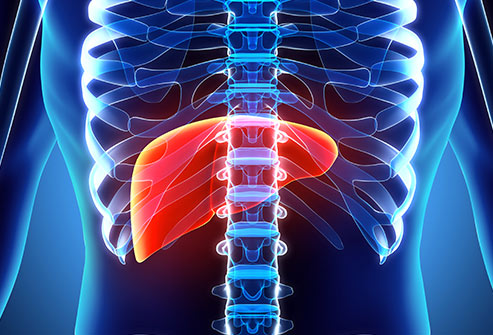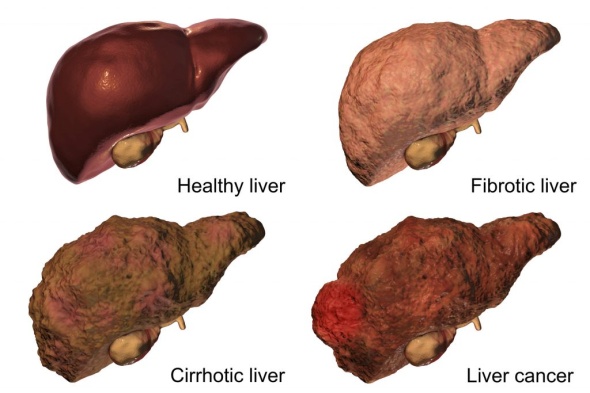 ATC
ATC
GUIDE TO LIVER PROBLEMS

Lots of things cause liver damage, and it tends to get worse over time. No matter the cause, it usually unfolds the same way. First your liver swells. Then it gets scars (called fibrosis). With treatment, your liver may heal. But without it, over time, the scars become permanent (this is cirrhosis) and your liver struggles to do its job. Last comes liver failure, which is life-threatening. It means your liver has stopped working or is about to.
Symptoms
At first, you probably won't notice liver problems. But as it gets worse, your skin can feel itchy and bruise easily. Your eyes and skin may look yellowish, which doctors call jaundice. Your belly might hurt, and you could lose your appetite or feel sick to your stomach. Your legs, ankles, and belly may swell, too.
Acute Liver Failure
Most liver disease is chronic. It happens slowly over years. But sometimes, it comes on fast. While the symptoms are the same -- including jaundice, pain, and upset stomach -- acute liver failure takes only weeks or even days. And it can be life-threatening. So see a doctor right away when you have symptoms.
Causes

Some liver problems are related to diseases and other health conditions. Others have to do with your lifestyle, which you have some control over -- like how much you drink and how much (or little) you exercise.
-
Obesity
As the country has gotten heavier, rates of liver disease have gone up. Extra weight raises your odds of non-alcoholic fatty liver disease, when fat builds up in your liver. Most of the time, this condition is harmless. But for some people, it gets worse and leads to cirrhosis and other problems.
-
Alcohol
Heavy drinking is tough on your body. The liver's process of filtering alcohol out of your blood creates harmful chemicals. Drink too much booze for too long a time and those chemicals damage your liver. The first stage of alcoholic liver damage, when extra fat builds up, is called alcoholic fatty liver. If you keep drinking, you're likely to get alcoholic hepatitis, cirrhosis, and eventually liver failure.
-
Drugs and Chemicals
Helpful medications and supplements can sometimes cause acute liver damage, including some antibiotics, acetaminophen, and NSAID pain relievers like ibuprofen and naproxen. Usually, it happens only when you take a very high dose or mix these with alcohol or other drugs. Street drugs like heroin and cocaine also cause liver damage. So can some chemicals used in dry cleaners and factories.
-
Infections
Hepatitis (including A, B, and C) and other viruses can cause acute or chronic damage to your liver. Your chances of getting hepatitis are higher if you share needles when you use drugs, have unprotected sex, have sex with a lot of people, or live in areas where food or water isn't safe.
-
Autoimmune Conditions
If your immune system goes into overdrive, it could attack healthy parts of your body, including your liver. That's what happens with autoimmune hepatitis and primary biliary cirrhosis. Treatment to curb the immune system's reaction may help.
-
Duct and Blockage Problems
Primary sclerosing cholangitis causes scars in the ducts that carry bile from your liver to your intestines. Over time, it can cause serious liver damage. So can the rare Budd-Chiari syndrome, when veins in the liver get blocked off. Gallstones that block bile ducts can cause jaundice and other problems. You're also more likely to have gallstones when you have liver disease.
-
Cancer
Different types of cancer can affect the liver, although most spread from other parts of the body. Your chances of getting liver cancer -- the kind that starts in the liver -- are higher when you already have damage from fatty liver disease, cirrhosis, hepatitis, liver failure, and other conditions. If that's the case, your doctor may suggest you get checked regularly so you can catch cancer early.
-
Genetic Problems
Some people are born with rare conditions that can cause liver disease. Symptoms may show up when they're babies or not until 40 or 50 years later. Alpha-1 antitrypsin deficiency (A1AD) means your body doesn't make enough of a special protein that protects against liver damage. Hemochromatosis lets too much iron build up in your liver. Similarly, someone with Wilson disease will have too much copper in their liver.
Diagnosis
Your doctor will start with blood tests to see how well your liver is working. They may use ultrasounds, CT scans, and MRIs to get a look at it and check for damage. Some people also need a biopsy. That's when a doctor uses a needle to take a tiny sample of the liver and then tests it.
Treatment
In early stages of liver disease, lifestyle changes can often heal liver problems completely. Even with advanced disease, they can often limit the damage. Medications such as steroids, surgery, and other treatments may also help slow down or stop liver disease.
-
Stop Drinking
Whether your disease is mild or severe, your liver will be happier if you quit. Can't do it on your own? Speak up. Ask your doctor for help getting into a treatment program. To help prevent liver disease, limit yourself to no more than one drink per day for women, two for men.
-
Eat Well and Exercise
If you're heavy, try to lose some weight. It can improve your liver health and even cure some types of early-stage liver disease. Regular exercise is great whether or not weight is an issue. Eat a balanced diet, with lots of healthy grains, fruits, vegetables, and lean proteins. Choose high-fiber foods, and limit high-fat things like fried foods as well as salt.
-
Transplants
For a severe problem like liver failure, they can be lifesaving. A surgeon will remove the sick liver and replace it with a healthy one. But a transplant doesn't have to be a whole liver. Sometimes, the doctor can use just part of a liver from a living person. In time, it will grow to full size, and the donor's will grow back, too.
-
Read Medication Labels
Follow the instructions on whatever drug or product you use. Don't take more than the recommended amount. And never mix any medication with alcohol unless your doctor or pharmacist said it's safe. If you have liver problems, you should check with your doctor before you take any new medicine, supplement, or vitamin.
-
Take Care of Your Health
Get checkups regularly so your doctor can keep an eye on how you're doing with exams and tests. Follow the recommended treatment for conditions such as high blood pressure and diabetes that can make liver problems worse. Check with your doctor about shots like hepatitis vaccines to protect your liver from damage.
Prevent and Reverse Kidney Disease
It’s easy to take your kidneys for granted, but they work around the clock, like a high-tech, nonstop water filter for your blood. They process up to 150 quarts of blood every twenty-four hours just to make the 1–2 quarts of urine you pee out each day.
If your kidneys do not function properly, metabolic waste products can accumulate in the blood and eventually lead to such symptoms as weakness, shortness of breath, confusion, and abnormal heart rhythms. Most people with deteriorating kidney function,
however, don’t experience any symptoms at all. If your kidneys fail completely, you will either need a new one (i.e., need a kidney transplant) or have to go on dialysis, a process by which a machine artificially filters the blood. But kidney donors
are in short supply, and the average life expectancy of a person on dialysis is less than three years. It’s better to keep your kidneys healthy in the first place.

Although your kidneys can fail suddenly in response to certain toxins, infections, or urinary blockage, most kidney disease is characterized by a gradual loss of function over time. Approximately one in three Nigerians over the age of sixty-four may suffer from chronic kidney disease (CKD), though three-quarters of the millions affected may not even know they have it. More than half of adults currently aged thirty to sixty-four are expected to develop chronic kidney disease during their lifetimes. The diets that are healthiest for our hearts—those centered on unprocessed plant foods—may be the best way to prevent and treat kidney disease as well.
Damaging Your Kidneys with Diet
Kidneys are highly vascular organs, meaning they’re packed with blood vessels, which is why they look so red. We’ve already seen that the standard Western diet can be toxic to blood vessels in the heart and the brain—so what might it be doing to the kidneys? Putting that question to the test, researchers at Harvard University followed thousands of healthy women, their diets, and their kidney function for more than a decade to look for the presence of protein in the women’s urine. Healthy kidneys work hard to retain protein and other vital nutrients, preferably filtering toxic or useless wastes out of the bloodstream via our urine. If the kidneys are leaking protein into urine, it’s a sign that they may be starting to fail. The researchers found three specific dietary components associated with this sign of declining kidney function: animal protein, animal fat, and cholesterol. Each of these is found in only one place: animal products. The researchers found no association between kidney function decline and the intake of protein or fat from plant sources.
Reducing Dietary Acid Load
Another reason animal protein may be so detrimental to kidney function is that it is generally more acid forming. This is because animal protein tends to have higher levels of sulfur-containing amino acids, such as methionine, which produce sulfuric acid when metabolized in the body. Fruits and vegetables, on the other hand, are generally base forming, which helps neutralize acids in our kidneys. Dietary acid load is determined by the balance of acid-inducing foods (such as meats, eggs, and cheese) and base-inducing foods (such as fruits and vegetables). A 2014 analysis of the diets and kidney function of more than twelve thousand Americans across the country found that a higher dietary acid load was associated with significantly higher risk of protein leakage into the urine, an indicator of kidney damage. Ancient human diets largely consisted of plants, so they likely produced more base than acid in the kidneys of our ancestors. If people are unwilling to reduce their meat consumption, they should be encouraged to eat more fruits and vegetables to balance out that acid load.
Kidney Stones
Eating a plant-based diet to alkalinize your urine may also help prevent and treat kidney stones.The incidence of kidney stones has increased dramatically since World War II and even just in the last fifteen years. What accounts for this rising incidence? The first clue to an answer came in 1979 when scientists reported a striking relationship between the prevalence of kidney stones since the 1950s and increasing consumption of animal protein. As in all observational studies, though, the researchers couldn’t prove cause and effect, so they decided to perform an interventional trial: They asked the subjects to add extra animal protein to their daily diets, the equivalent of about an extra can’s worth of tuna fish. Within two days of eating the extra tuna, the levels of stone-forming compounds—calcium, oxalate, and uric acid—shot up such that the subjects’ kidney-stone risk increased 250 percent.
